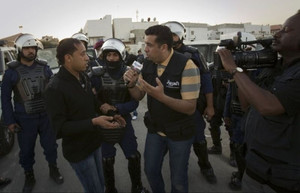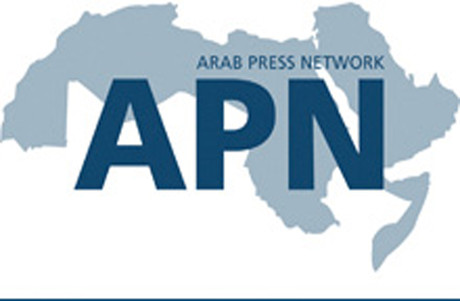(This article was first published on 28/3/2012)
A number of organisations have conducted missions and produced reports that investigate the state of freedom of expression in Bahrain, only to come up with one common result; things are getting worse. Journalists and human rights defenders have faced military trials, life imprisonment, torture, harassment, and in some cases even death whilst in the custody of the Bahraini authorities.
Despite this, Manama named itself the Capital of Arab Press for 2012 (it has been awarded the status of Capital of Arab Culture for 2012 by the Arab League as part of UNESCO's cultural capitals programme), and recently hosted the Arab Youth Media Forum under the patronage of King Hamad Al-Khalifa. "This choice is the result of the freedom of the press enjoyed by Bahrain thanks to the reform project of His Majesty King Hamad bin Isa Al Khalifa as well as IAA attraction of Arab and international media institutions to operate from Bahrain," said Information Affairs Authority President Shaikh Fawaz bin Mohammed Al Khalifa in an interview with the state-run Bahrain News Agency (BNA). Shaikh Fawaz also pointed out that "the King has asserted on many occasions that no journalist will be imprisoned nor will any newspaper or media establishment be closed," adding that "approving a modern press and publication law reflects HM the King's full support to Bahrain's press." The choice seems incongruous at best given the numerous attacks against independent journalists documented throughout 2011 - and that are reportedly still on-going.
Newspapers in Bahrain are mostly state-controlled, with the exception of Al-Wasat whose staff have certainly paid the price for being the only opposition newspaper. On 12 April 2011, Al-Wasat founder Karim Fakhrawi died after spending a week in police custody. Bahrain's official news agency published on its Twitter page the news that Fakhrawi died of kidney failure, however photographs later emerged online showing the body identified as Fakhrawi's covered in extensive cuts and bruises. Mansoor Al-Jamri was forced to resign from his position as Editor-in-Chief after being found guilty by a Manama court on 8 November 2011 of publishing false news and “harming Bahrain’s image” along with Managing Editor Walid Noueihed, Local News Director Aqeel Mirza, and Senior Editor Ali Al-Sherify. The four men each had to pay a fine of 1,000 dinars (US$2,650).
Prominent journalist Reem Khalifa (the wife of Mansoor Al-Jamri) was attacked and assaulted by government supporters on 14 July while attending a conference in a Manama hotel. Khalifa later filed a complaint against the attack, however the authorities ignored her complaints and she was instead summoned for questioning by the public prosecutor.
On May 22nd, 2011, Nazeeha Saeed, Bahrain correspondent for France 24 and Radio Monte Carlo Doualiya, was tortured while undergoing interrogation in a police station in the city of Rifa'a. Saeed was accused of spreading lies and “harming Bahrain’s image”, and was only released after being forced to sign documents she hadn’t been allowed to read in advance.
The crackdown has not been limited to local Bahraini journalists; foreign journalists also received their fair share of mistreatment at the hands of the authorities. New York Times correspondent Nick Kristof and photojournalist Adam Ellick had their equipment damaged when teargas was fired at them on 9 December. The two journalists were detained for 30 minutes in a police car before a senior officer arrived to question the pair before they were released.
Since the beginning of the uprisings many foreign journalists and TV channels have been denied access to Bahrain. One of the few journalists who managed to get into the country was May Ying Welsh, director of the controversial Al-Jazeera English documentary Bahrain: Shouting in the Dark. "Al Jazeera English repeatedly asked the Bahraini authorities for permission to work in the country and we were either denied authorisation or given no response to our requests," said Welsh, speaking to WAN-IFRA. "I went to Bahrain undercover, entering the country as a tourist, because failing to cover an Arab revolution happening on our doorstep was simply not an option." she added. "Al Jazeera did not stop covering the revolution in Egypt when Hosni Mubarak banned our channel, we have not stopped covering Syria, we did not stop our coverage in Gaddafi's Libya, and we did not stop working in Bahrain. We have a responsibility as journalists to do all we reasonably can to cover stories of regional and international importance and to keep our viewers informed."
According to the Bahrain Center for Human Rights’ latest report (published 26 March 2012), at least six foreign journalists were denied entry visas to Bahrain in February of this year, suggesting that the authorities are still reluctant to open themselves up to full scrutiny. Amongst them were Gregg Carlstrom from Al-Jazeera, Alex Delmar-Morgan from the Wall Street Journal, Kristen Chick from the Christian Science Monitor and Cara Swift from the BBC.
With the on-going challenges faced by both local and foreign journalists, bloggers and citizen journalists who shot to prominence during the uprisings continue to play a critical role in spreading the news both locally and internationally. The authorities quickly realised their importance, however, and Bahraini bloggers and social media activists have been targeted in the same way as their journalist colleagues. On 2 April, 2011 blogger Zakariya Al-Ashiri was arrested and kept in police custody for a week before dying under mysterious circumstances. The authorities claimed that Al-Ashiri's death was a result of complications due to sickle-cell anaemia, but his family denied that the blogger suffered from the illness, or indeed any other ailment.
Prominent blogger and founder of Bahrain Online, Ali Abdulemam, is currently missing, his whereabouts unknown. He is believed to be in hiding after being tried in absentia and sentenced to 15 years imprisonment by a Military Court in June.The same court has also sentenced blogger and political leader Abduljalil Al-Singace to life imprisonment.
Twitter activist and human rights defender Zainab Al-Khawaja was detained during a protest in early December 2011; she was released a few days later and is now awaiting trial. The 28-year old activist was the fourth Al-Khawaja family member to have been arrested following her father, brother-in-law and husband. Zainab's father, senior opposition leader and founder of the Bahrain Center for Human Rights Abdul Hadi Al-Khawaja, is currently on hunger strike in protest against his life sentence.
As a result of these cases, Bahrain moved from the "under surveillance" category to be included in the latest Reporters Without Borders' "Enemies of the Internet " list. The websites of The Bahrain Center for Human Rights' (BCHR)andTheArabic Network for Human Rights Information (ANHRI), amongst others, have been blocked by the government and are not accessible inside Bahrain.
"The government does worry about its image and reputation and would not want to be called a restrictive government that attacks the press," says Fatima Isa, an activist at The Bahrain Center for Human Rights. "However, instead of taking practical steps to solve the pending issues and actually allowing journalists and citizen journalists to freely practice their work without harassment, the government of Bahrain believes it can solve all problems via PR work. Even during the recent Arab Youth Media Forum, the restrictive mentality showed its face in an article that appeared in pro-government newspaper Al-Ayam : ‘Warning to social networks and a call to enact modern laws governing them.’ »
According to website Arabianbusiness.com, Washington-based PR companyQorvis Communications is said to receive a monthly stipend of US$40,000 from the Bahraini government to help project a favourable image of the regime in the Western media. The company operates by either releasing articles on outlets such as PR Newswire or sending emails directly to journalists that defend the government's actions. Qorvis is not the only company accused of assisting in the whitewashing of the Bahraini regime; British PR Firm BGR Gabara has reportedly also been working with the government.
Despite evidence to the contrary, a pro-government blogger - who spoke to WAN-IFRA under condition of anonymity - argues that: "ever since the National Action Charter in 2001 Bahrain has seen a major transformation in human rights and particularly freedom of expression. It used to be that you couldn’t criticise the government but now there is carte blanche to speak on any topic. There are no restrictions on the press, other than internationally agreed standards such as libel."
Fatima Isa believes, however, that the devil is in the detail. "Although freedom of expression is enshrined in the constitution, the guarantees are qualified by the phrase ‘under the rules and conditions laid down by law,’ which essentially negates them, Similarly, the 2002 Press Law promises free access to information but with the qualification ‘without prejudice to the requirements of national security and defending the homeland.’ These loosely-worded clauses allow for arbitrary interpretation."
Many Bahraini journalists are now forced to live in exile after fleeing the country in fear of being detained or worse. The Bahrain Press Association (BPA) was founded in London by a group of Bahraini journalists who were concerned with defending journalists and media personnel. "The BPA strives to provide the missing link in Bahrain when it comes to the existence of an entity concerned with defending the rights of journalists, media personnel, and freedom of expression," says Adel Marzooq, President of the Association. "The regime has dominance over all civil society organisations and forces them to adopt solely its viewpoint on all hot topics. This biased practice has tremendously affected the professionalism of such entities as well as their impartiality, especially given the on-going political crisis in Bahrain."
The contradiction between journalists' testimonies and the government's representation of events couldn’t be clearer, but at the very least it is an indication that Bahraini journalists and human rights defenders are speaking up and refuse to give up their right to freedom of expression. How long they will be able to fight the authorities with only their voices and pens as weapons remains to be seen.
To download latest reports on Bahrain, please see below.
To watch the documentary "Bahrain: Shouting in the dark", click here.
For more information on the situation in Bahrain, check out the following links:
-Committee to Protect Journalists
-International Freedom of Expression Exchange
-Bahrain Center for Human Rights
For commentary on the situation in Bahrain, please follow:





